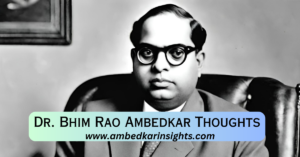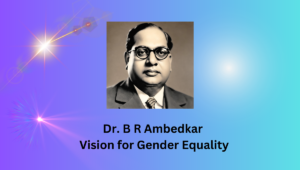|
Getting your Trinity Audio player ready...
|
Ambedkar thoughts on social justice laid the foundation for his role as a monumental figure in the history of modern India. Dr. Bhimrao Ramji Ambedkar, affectionately known as Babasaheb, was renowned for his relentless pursuit of social justice and equality. Born on April 14, 1891, in a socially marginalized Dalit family, his early life was marked by the sting of caste-based discrimination, profoundly shaping his lifelong crusade against such injustices. His extraordinary intellect led him to pursue higher education, a rarity for someone from his background at that time, eventually earning law degrees and multiple doctorates from prestigious institutions like Columbia University and the London School of Economics.
As the principal architect of the Indian Constitution, Ambedkar played a pivotal role in shaping the legal and social fabric of independent India. His contributions went beyond framing the constitution; he was a visionary who championed the cause of the oppressed and marginalized sections of society. His relentless advocacy for the rights of Dalits, women, and labourers transformed the narrative of social justice in India. Ambedkar’s legacy as a social reformer, jurist, economist, and politician remains a beacon of hope and inspiration, highlighting the path towards a more equitable and just society.
Early Life and Education
Dr. B.R. Ambedkar’s early life and education were marked by formidable challenges and remarkable achievements, setting the foundation for his later work as a social reformer. Born into a Dalit family in 1891 in Mhow, India, Ambedkar faced the harsh realities of caste discrimination from a young age. Despite these societal barriers, his determination and intellect shone through. His father, Ramji Maloji Sakpal, an army officer, and his mother, Bhimabai, encouraged his education, which was rare for Dalits at that time.
Ambedkar’s educational journey was a beacon of hope amidst the prevalent social inequalities. He initially attended local schools where he experienced social ostracism, but his academic prowess was undeniable. In 1913, he received a scholarship from the Maharaja of Baroda to study at Columbia University in New York. This opportunity was transformative. At Columbia, he was exposed to a world where intellectual pursuits were not hindered by one’s social background. He immersed himself in studies of economics, sociology, history, philosophy, and law, earning a master’s degree in 1915.
In 1916, Ambedkar moved to the London School of Economics for further studies. His time in London deepened his understanding of legal systems and economic theories, and he began to view these as tools to combat social injustices. It was during this period that he crystallized his views on caste and social reform, setting the stage for his future role as a crusader for social justice. His academic experience in the West, free from the constraints of the caste system, profoundly shaped his perspectives and fueled his determination to reform Indian society. This formative phase laid the groundwork for Ambedkar’s emergence as a leading voice for the marginalized and an advocate for a society based on principles of equality and justice.
Fight Against Caste Discrimination
The caste system in India, a rigid social hierarchy, has been a deeply entrenched aspect of Indian society for centuries. This system categorizes people into different social classes (castes) at birth, dictating their social status, occupation, and potential for upward mobility. Dr. B.R. Ambedkar, born into a Dalit family (historically considered the lowest caste), experienced firsthand the brutalities of caste discrimination, shaping his resolve to combat this injustice.
Ambedkar’s personal experiences with caste discrimination were profound. He was segregated and mistreated in school, and these injustices continued into his adult life, influencing his worldview. His struggles ignited a fierce commitment to challenge and dismantle the caste system.
To fight caste-based injustices, Ambedkar adopted a multi-faceted approach. He became a prominent political leader and social reformer, advocating for the rights of Dalits and other marginalized groups. He founded movements and organizations, such as the Bahishkrit Hitakarini Sabha (1924), aimed at promoting education, socio-economic upliftment, and welfare of the oppressed castes. His activism included leading peaceful protests, demanding water access rights, and fighting for the right to enter temples.
Ambedkar’s Vision of Social Justice
Ambedkar’s writings and speeches provide a comprehensive view of his interpretation of social justice and equality. He believed in a society where every individual, irrespective of their caste, had equal rights and opportunities. His book “Annihilation of Caste” is a seminal work that critiques the caste system and advocates for its dismantling.
He emphasized education as a powerful tool for socio-economic empowerment. Ambedkar saw education not just as a means of personal development, but as a weapon to fight oppression and achieve social reform. He also believed in economic empowerment, advocating for fair labor rights and the establishment of a society that supported the economic progress of its most marginalized.
Ambedkar was a strong advocate for women’s rights and emancipation. He fought for the Hindu Code Bill, which sought to provide equal rights to women in inheritance, marriage, and the workforce, viewing gender equality as an essential component of a just society.
Drafting the Indian Constitution
As the Chairman of the Drafting Committee of the Indian Constitution, Ambedkar played a pivotal role in shaping India’s legal framework. He ensured the inclusion of provisions for protecting civil liberties and promoting social justice. One of the most significant aspects was the introduction of the Reservation system (Affirmative Action), providing quotas in education and government jobs for marginalized communities, aiming to correct historical injustices.
Ambedkar’s legacy in the Indian legal system is profound. His contributions ensured that the Constitution upheld principles of justice, liberty, equality, and fraternity, laying a solid foundation for a democratic India.
Impact on Contemporary Society
Ambedkar’s influence on contemporary Indian politics and society is immense. His ideas and ideals continue to inspire political and social movements. The evolution of Dalit movements in India, advocating for social and economic rights, draws heavily from his teachings and activism.
Global Relevance and Legacy
Globally, Ambedkar is recognized as a symbol of the fight against social injustice. His thoughts resonate with various international social justice movements, emphasizing the universality of his message. His work has been acknowledged and celebrated internationally, establishing him as a global icon for human rights and equality.
Conclusion
Dr. B.R. Ambedkar’s contributions to social justice are monumental. His relentless fight against caste discrimination, vision for an egalitarian society, and role in shaping the Indian Constitution mark him as a pivotal figure in the history of social reform. His teachings and ideals remain relevant and inspiring, continuing to guide the pursuit of equality and justice in modern times.




